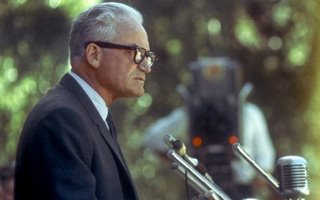 I was never a fan of Barry Goldwater, although I found his blunt way of talking rather refreshing. He was the virtual embodiment of conservatism in the middle years of the 20th century. His book, The Conscience of a Conservative, was the bible of conservative thought in the 1960's.
I was never a fan of Barry Goldwater, although I found his blunt way of talking rather refreshing. He was the virtual embodiment of conservatism in the middle years of the 20th century. His book, The Conscience of a Conservative, was the bible of conservative thought in the 1960's.Lyndon Johnson, elevated to office by the assassination of President Kennedy, trounced Goldwater in the 1964 campaign for the Presidency. I was a high school student at the time and mostly remember Goldwater as the guy who was going to lead us into nuclear war because of his "extremism." I remember the famous quote in his acceptance speech at the Republican Convention:
"I would remind you that extremism in the defense of liberty is no vice! And let me remind you also that moderation in the pursuit of justice is no virtue."
He took a huge amount of heat for that one, although I have to admit that the quote actually makes a valid point. Goldwater generated a lot of fears at a time when people were building fallout shelters in their backyards. I remember the short-lived television commercial depicting a little girl innocently pulling petals off a flower as a mushroom cloud explodes in the background.
Now comes an interesting HBO documentary, Mr. Conservative: Goldwater on Goldwater. Produced by his granddaughter, it is a sympathetic depiction of the man, but it also has some important insights into politics then and now. Let me mention two.
The first is the capacity of politicians 40 years ago to mightily disagree with one another in Congressional deliberations and then to go out together, have a drink or dinner, and talk about life and family. There are many examples of this--Hubert Humphrey, Tip O'Neill, Lyndon Johnson. Barry Goldwater was another.
According to the documentary, Goldwater was a good friend of John F. Kennedy. It became apparent at some point that the two of them might very well be running for office on their party tickets. They talked about how they would campaign and apparently agreed to travel the country on the same plane, disembarking to discuss their vast differences on public policy issues, then climbing aboard together as friends enroute to their next stop.
Such a thing would never happen today, and we are the poorer for it. The politics of personal attacks, dirty tricks, and polarization are what we have in place of the spirited but respectful dialogue of another time. Oh them good old days!
The other thing learned from the film is that labels don't fit. Many of Goldwater's positions would be comfortably embraced by today's social liberalism. He had a gay grandson who he supported without qualification. He was appalled by those who tried to insert religious agendas into public policy.
The film is well worth a look. It helps us put perspective on today's political machinations and demagoguery. How we long for a climate where men and women of goodwill are allowed to speak their minds and unburden their hearts without fear that their lives will be stripped bare in the tabloids. The politics of personal destruction distorts and mutes the political discourse this nation needs.
I'm glad Barry Goldwater did not become president. But I am also glad that he brought his ideas into public life and participated in the vigorous but respectful dialogue that our world has a right to expect from those who would lead us.
Technorati tags: Politics Dialogue Goldwater